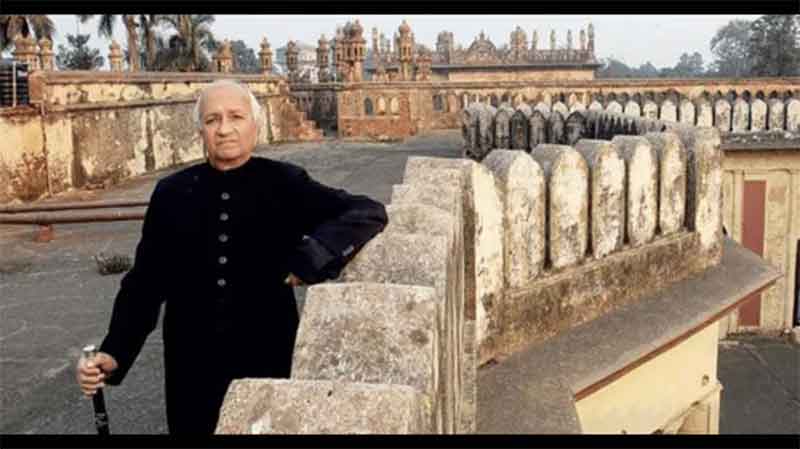
On 4th October 2023, passed away Mohammad Amir Mohammad Khan and with this, set another sun in the sky of Awadhi manners and culture (adab–o–tehzeeb). He was popularly known among many of his admirers and well wishers as Suleiman miyan. He was the only son of the last Raja of Mahmudabad, a quaint town (qasba) in the Sitapur district of central Uttar Pradesh. Suleiman miyan was not well for last few months. A lot of obituaries have been written on him, focussing on his family’s past and present and its contribution to the ganga-jamuni tehzeeb. Some have successfully captured the aura of Suleiman miyan. No doubt, he was a philosopher prince (king?) in every sense of the term– deep, sensible, poetic, well-read, and humane. He was a man of letters, maintaining his family library at Mahmudabad House in Lucknow. He was fluent in Urdu, Persian, and English and had taste for all the finer and cerebral things in life be it history, science, Islamic theology, or Sufi music. Though trained formally in the field of astrophysics at the University of Cambridge, UK, he could recite Urdu couplets, Persian verses, English literature and world history seamlessly. No denying, this was due to the fact that he was a successor of one of the most illustrious families of Awadh.
Suleiman miyan’s grandfather was a great admirer of modern education. Maharaja Mohammad Ali Mohammad Khan was one of the founding members of Lucknow University and a patron of a number of educational institutions like King George’s Medical College, Amir-ud-Daula College, Banaras Hindu University and Aligarh Muslim University. He was also the first Vice Chancellor of AMU. The famous Lucknow Pact of 1916 was signed by Motilal Nehru and Momammad Ali Jinnah at his home, Mahmudabad House in Lucknow. The pact is taught as a classic case to understand the vision of leaders for maintaining pluralism in British India. Like his ancestors, he was also a poet and equally pious. Alongside modern education, the family also ran Madrasatul Waizeen, a theological seminary to spread the message of love, peace and compassion in the framework of Shia’ism. Founded in 1919, its graduates travelled across the globe promoting inter-faith dialogue across national boundaries. Being sensitive to the cause of women’s education, the Maharaja donated money for the building of Karamat Husain Girls School. The library at Mahmudabad has one of the finest collections of Persian and Arabic manuscripts. It is here that we see that piety and pluralism becoming the signature of the Mahmudabad family.
Suleiman miyan’s father Raja Mohammad Amir Ahmad Khan was also following in the same footsteps. Religion and modernity went together for him too. He was addressed as ‘bhai sahib’ by Motilal Nehru. His essay Some Memories published in Mushirul Hasan’s edited volume India’s Partition (1993) is something which won my heart. Written in an autobiographical form, it tells us how Partition was complex and multi-layered. People who were alive at that time, themselves found it difficult to grasp. The (north) India of the 1920s and the early 1930s was not the (north) India of early the 1940s. This change of the course of history from pluralism to separatism has received some scholarly attention. One point, however, is missed that recent traditions in historiography have been focussing on India’s partition from the perspective of women and Sikhs. BR Ambedkar’s Communal Deadlock and a Way to Solve it (1945) is a good text to understand his perspective on the partition of India.
Suleiman miyan was very particular about Islamic philosophy and Moharram rituals, a tradition his forefathers kept alive for around two centuries. It is here that the Mahmudabad family stands apart from the rest of the world. My elders tell me that Suleiman miyan was very particular about the facts of Islamic history and pronunciation of Quranic verses. There was an air of regality wherever he went or whatever he did- be it participating in the Moharram processions or reciting marsiyas at majlis (gatherings). They not only proclaim that Islam is inclusive; they enact this through annual Moharram rituals. Not only Shias but also Sunnis and Hindus attend the ten-day long Moharram rituals. Be it listening to the majlis inside the Mahmudabad qila or observing matam and zuljanah outside, visitors are given warm welcome. One of the distinct aspects of these rituals is the large scale participation of Dalits. Almost exclusively, Dalits perform two rituals during Moharram- recitation of poetry (dahas) and running long distances (chauki bharna). This has grown organically and Mahmudabad family is preserving these local sensibilities alongside prescriptive norms of Islamic thought. We see shehnai being played to the tune of dirges (nauhas) and war-drums being beaten in the Moharram of Mahmudabad. Religious pluralism here is not limited to the elites and is actively actualised by the followers of various castes and creeds. It is a family with transnational network but whose node is local.
Suleiman miyan got this heritage from Raja- Maharaja, and on his departure from this world, he has passed on his virtues to his sons. To talk about late Suleiman miyan and not to talk about his virtues would have been incomplete. Tenderness of heart and tears in the eyes marked his persona. This write-up is a small tribute to his great life and work.
Zeeshan Husain has done MA from TISS, Mumbai and PhD from JNU, Delhi. He researches on society and polity of Uttar Pradesh. These days he is reading on Dr B.R. Ambedkar and his idea of minorities. He tweets @DrZeeshanHusain.
















































